March 7, 2025 | 03:06 GMT +7
March 7, 2025 | 03:06 GMT +7
Hotline: 0913.378.918
March 7, 2025 | 03:06 GMT +7
Hotline: 0913.378.918
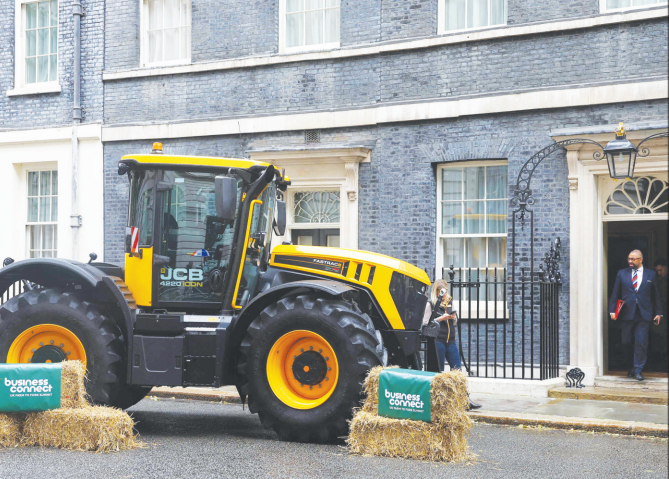
Former Britain's home secretary James Cleverly looks towards a tractor, which promotes the Farm to Fork summit organized by the UK government, as he leaves 10 Downing Street on May 14. Photo: AFP.
An Olympic Games opening ceremony allows the host to tell the watching world a story about itself that it has written. In 2012, it was London's turn and it opened with rural scenes and singing of the hymn Jerusalem.
The setting of William Blake's poem is a love song to England's green and pleasant land, and its status as an unofficial second national anthem shows how much feeling it stirs in so many people. But 12 turbulent years on from that spectacular night, there are storm clouds over the green and pleasant land.
Years of disregard, ignorance, and politics have pushed British agriculture to the brink, and on Nov 19, the country will come to the city to air its grievances, when a mass protest by farmers is set to take place in central London.
According to figures from the Department of the Environment, Food and Rural Affairs, in 2013, there were 222,000 farm holdings in the UK, but in 2023, that figure was 209,000.
In the run-up to the 2016 referendum on European Union membership, then-farming minister George Eustice told the BBC "virtually every problem that the (National Farmers' Union) complains to me about is a direct consequence of dysfunctional EU law", and that farmers who "want to see change and a better future" should vote to leave.
The union declined to take a formal stance but told members that on the "balance of existing evidence", their interests were best served by continued membership. This, of course, did not happen.
EU membership meant being subject to the Common Agricultural Policy, or CAP, an arrangement that existed "to improve agricultural productivity, so that consumers have a stable supply of affordable food" and, crucially, "to ensure that EU farmers can make a reasonable living" largely through a subsidy system.
Brexit cheerleader, former prime minister Boris Johnson said "our amazing food and farming sector will be ready and waiting to continue selling ever more, not just here but around the world", and "we will have a historic opportunity to introduce new schemes to support farming — and we will make sure that farmers get a better deal".
But it took five years for the CAP alternative, known as environmental land management schemes, to be introduced, and there have been complaints that it is unduly harsh on smaller producers.
Since the Brexit deal was agreed, the EU remains Britain's biggest agricultural export market, but farmers are selling less to it than before, and the process of doing so is more complicated and costly.
In 2022, the EU accounted for 67 percent of the value of sales, down from 70 percent in 2019, with the total value of food and live animal exports to the EU 5.9 percent down for the same period.
Between 2019 and 2022, dairy products and birds' eggs exports to the EU were down 20 percent, meat exports fell by 24 percent, and fruit and vegetables fell by 25 percent, with factors such as newly-required paperwork adding to the reasons. One of the supposed Brexit freedoms was the ability for Britain to negotiate its own trade agreements, rather than being part of EU-wide ones. But a deal with the United States, confidently predicted since 2016, has still not happened.
Britain has swapped being part of a trading bloc with 27 neighbors for the 11-member Comprehensive and Progressive Agreement for Trans-Pacific Partnership, meaning it can send fresh produce to Malaysia rather than Munich, to Peru rather than Paris, and Vietnam rather than Vienna.
The first new trade deal, with Australia, was forecast to add just 0.08 percent to the UK's GDP during the next 15 years, with the government's own impact assessment saying there was the "potential for the deal to result in lower output for some agricultural sectors" because Australia is a "large, competitive producer of agricultural products".
Liz Webster lives on a 607-hectare mixed arable and cattle farm in Wiltshire and is the founder of Save British Farming.
She said a social disconnect dating back to the Industrial Revolution — also, coincidentally, part of the 2012 opening ceremony — means that for generations, urban Britain has failed to understand how rural Britain functions, and it has now reached breaking point.
"People's identity is linked to what this country looks like, and the green and pleasant land everyone loves looks how it does because of how it's been farmed for thousands of years," she explained.
Given its importance on a small, heavily populated island, agriculture has a low public profile in the UK.
The knowledge of many people is limited to the unlikely hit reality television series Clarkson's Farm, featuring former host of motoring show Top Gear, Jeremy Clarkson, getting to grips with the challenges of owning a 404-hectare farm, having had no previous experience in the sector.
It has shone a light on the harsh realities of a way of life and an industry that is often taken for granted by people who rely on it, but are not engaged with it.
Clarkson has now become a figurehead for farmers' discontent, most particularly over the new government's planned reforms to inheritance tax on farms, which Webster called "a culture war that shows they have scant regard for country life".
Clarkson is set to lead the London protest.
However, he has been accused of hypocrisy, having in 2013 explained his farm purchase by saying "land is a better investment than any bank can offer. The government doesn't get any of my money when I die".
Webster drew comparisons between the disregard shown to agriculture and the miners' strike of 1984, which in many regions left toxic social divisions that endure to this day, and killed the British coal-mining industry.
"After that strike, the few mines left were private and they do well, and I think that is what could happen to British farming if things continue like this," Webster explained. "There'll be a small number of high-class farms for the wealthy, and the rest of us will have to make do with imported or factory-farmed food, with all the damage that does, and there will be nothing we can do about it."
Much of the blame, she added, could be laid at the feet of another, more recent socially divisive event in British history — Brexit.
"There are as many different versions of Brexit as there are people who voted for it — they voted for change blindfolded, with no idea what that change was," she said.
"I always knew Brexit would mean more imports of lower standard and a harder time sending things abroad to our biggest market. But I didn't bank on it delivering the worst outcome of all, trade barriers for exports and an open deal for anything coming via Europe to come here, as they didn't put checks in."
In uncertain times, failure to secure British food security has left the country vulnerable — not just subject to political events, but also to the forces of nature, such as the recent floods in Spain.
"We had the cheapest and best-quality food in the EU, we're now allowing in a fl ow of imports over which we have no control, and once that happens, you can be held to ransom," she said. "For a long time, we've been reliant on just-in-time supplies from Europe, but the Spanish floods will cause a pinch point of food supply in the coming months."
David Catt, who runs a 28-hectare fruit and vegetable farm serving the local restaurant trade in Kent, in the south of England, knows all too well about the forces of nature, having had to sell off part of his property in the late 1980s after a freak summer hailstorm destroyed his season's crops in just 20 minutes.
The last few years, he said, have had the hardest growing conditions in 50 years, with the strain of natural challenges exacerbated by political decision-makers.
"Food is not a divine right," he said. "I'm 67, and I remember as a child going hungry because food was so expensive. (Politicians) haven't lived through that and are making decisions about things they don't understand. They expect everything available on their plate.
"For years, there's been no inheritance tax on farms for a reason — because farming is all about continuity. Forcing people to sell off land to pay inheritance tax will break up farms and make them less economically viable. It's an ill-thought-out idea from people who don't know where food comes from."
The upcoming protest, he said, "could be one of the biggest shows of dissatisfaction this country has ever seen". Almost every farmer he knows will be attending, and he said he believes they have public backing.
"Last time we protested up in London, a lot of farmers got very emotional at the level of support we received," he said. "We're giving the government a chance — we're telling them we're desperate, so they're warned."
In agriculture, what is reaped depends upon what was sown, and unless there is a change of approach soon, Britain could soon face a very poor harvest.
"My big worry is food security," said Catt. "Agriculture has been in recession for 30 or 40 years. It's at breaking point and it doesn't need to be. They need to realize that food security is key to a good economy, and a good country. You can't do anything without food."
Chinadaily
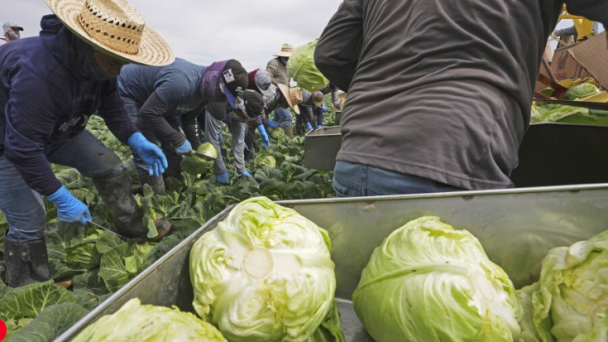
(VAN) Corn and soybean prices for this year’s harvest already fell roughly 10% since the tariffs were first announced a couple of weeks ago.
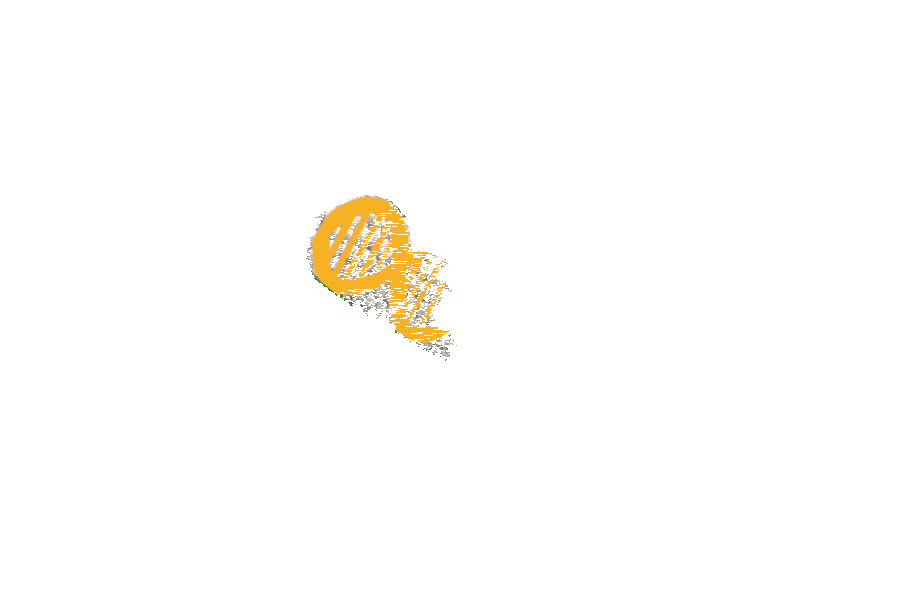
(VAN) There’s nothing inherently unsafe about genetically modified foods. It’s the potential herbicide exposure that should give you pause.
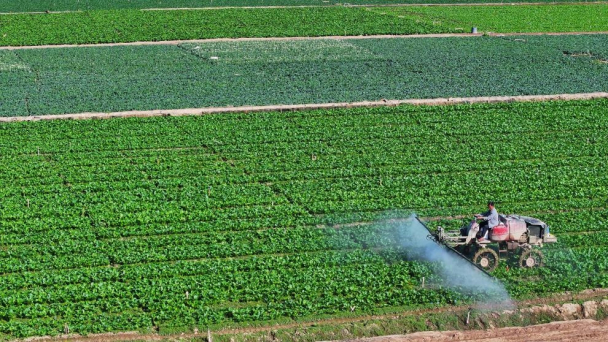
(VAN) China will focus on increasing per-unit yields of grain by expanding projects aimed at improving these yields and intensifying the promotion of high-yield and efficient production models.
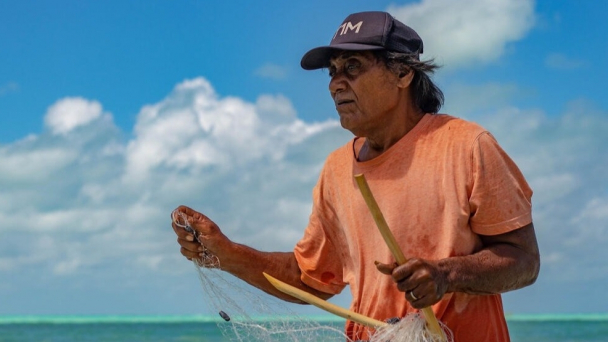
(VAN) Results from Pacific fishing areas are presented at Honiara Summit in Solomon Islands.
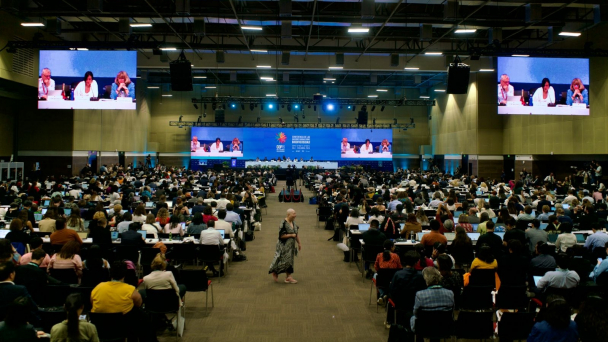
(VAN) Interview with Kaveh Zahedi, Director of the FAO Office of Climate, Biodiversity and Environment.
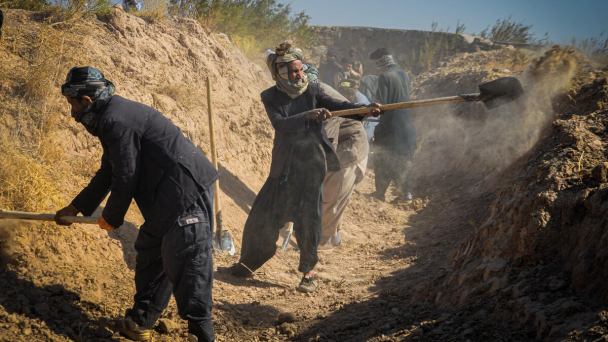
(VAN) The funding will support 14 critical projects across Africa, Asia, Europe, and the Middle East.
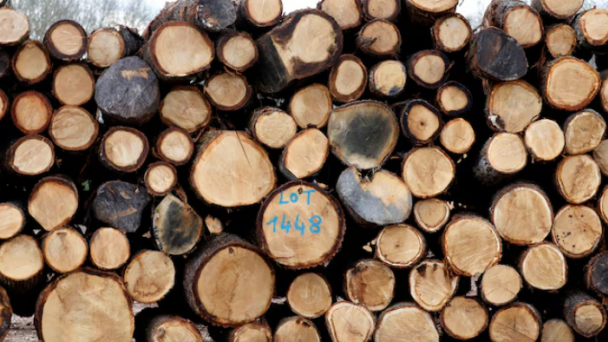
(VAN) Brussels already delayed the policy's launch by a year following complaints from trade partners including Brazil, Indonesia and the Biden administration in the United States.